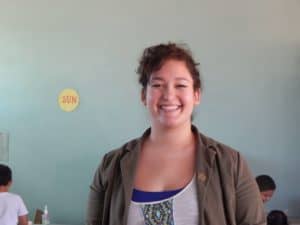
February 2, 2015
My bias toward Wisconsonian culture is primarily based on the limiting view of crazed Green Bay Packers fans wearing cheese wedge slices as hats. Additionally, as a haughty, New England, right coaster, I lump Wisconsin, Michigan, and Minnesota together. It’s really, really, really cold there, two or three days of summer in August at the most, and anyone purposely living under those conditions is very suspect. There aren’t any cities, everyone is a rural farmer, and the Lutheran Church forms everybody’s moral conscience. I blame the latter on NPR and Garrison Keillor. My bias of Wisconsin provincialism and narrow-mindedness was well-formed until just recently.
In January, Marcia LaSalle, a Milwaukee, Wisconsin native, arrived in Camasca, Intibucá, Honduras to begin four months of volunteer service at the Good Shepherd Bilingual School. Though her surname is French, her father is Puerto Rican. Her home life implied cultural diversity even as her mother, by Marcia’s own description, might have stepped right out of a Leave It To Beaver episode. Marcia visited Puerto Rico and her grandparents in Aguadilla, PR as a child and is close to many family members on her father’s side. Thus, she was acquainted with Spanish, but her father chose not to speak Spanish in the home. Marcia is very proud of her Latina heritage and wished she had learned more Spanish as a child. As a 21 year old adult, she is now becoming fluent in Spanish, having lived and traveled in Spain and now in Honduras. Not at all fearful or timid, seeking to expand her experiential horizon, she studied in England. The Wisconsin world traveler decided to spend the next four months in Honduras after completing the majority of her course requirements at St. Norbert’s College a semester early. When she returns in May she will have her BA in Anthropology.
Apart from that liberal, cosmopolitan, adventure-seeking, Wisconsin spirit, what brought Marcia to Honduras? A childhood friend spent some time here in Honduras with Shoulder to Shoulder. Whereas that had to have been influential, it’s perhaps best understood as presenting her the door to opportunity. Choosing to open that door was not in order to follow her friend, but to sate her own spiritual quest. Marcia witnesses an inner drive to meet and know others outside her own comfort zone. It is no surprise that she majored in anthropology. She admits to a fascination with culture. How is it that we can be so different, and yet so the same, and why? Most of us are content to be with others who act, think, and feel in similar ways. There’s a safety in sameness. But Marcia discovered that the best way to be pulled and challenged, to be self-reflective and to grow, is to feel just a little insecure around persons unlike oneself.
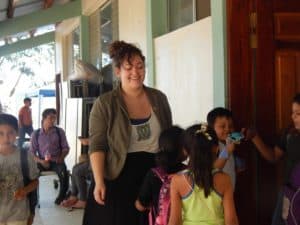
Marcia is at our bilingual school. Though she makes no claims on either being, or wanting to be, a teacher, she is present and sharing with the children. She’s teaching them English as they are helping her to hone her Spanish. They are communicating. More importantly, they are reaching out across culture, respecting that which is different and celebrating that which is the same. As a true anthropologist, Marcia is learning and teaching what is most important, even beautiful, about being human. Thanks Marcia. I will never again think of a Wisconsin with such limiting, narrow bias.
Perhaps you, even as you’re reading this, feel a certain tug to place yourself outside of your comfort zone. Maybe you would like to live in a developing country, serve and be served by the persons you would meet. Perhaps you have a little knowledge of Spanish, or a lot, or you just want the challenge of it all. If this describes you, maybe you should consider volunteering. Give it some serious thought. You can start by looking at the possibilities with Shoulder to Shoulder at https://www.shouldertoshoulder.org/volunteer-opportunities.
Educate a Child and Change the World
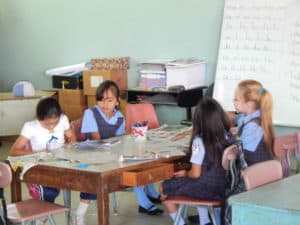
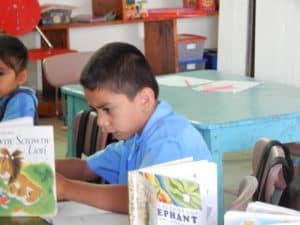
November 24, 2014
Shoulder to Shoulder is pleased and proud to introduce the Good Shepherd Bilingual School Sponsorship Program to advance our mission in the frontier region of Intibucá, Honduras.
Why Education?
The river story, often attributed to the social reformer Saul Alinsky, recounts a scene along the banks of a fast moving river. People are drowning and others are jumping into the river to save them. One individual leaves the scene to move upstream. He is initially scolded for abandoning the vital task of saving lives. But, he is actually searching out the source of the problem to learn why and how people are falling into the river in the first place, in order to resolve the issue.
Education in Honduras is certainly an upriver issue. Children are only legally required to go to school through the sixth grade. Public education is free in Honduras. But when you factor in costs of transportation, books and materials, uniforms, and so on, families that can barely feed themselves are greatly burdened by this “free” education. Public education is poorly supported by the Honduran government. Buildings are inadequate and not maintained. Materials are unavailable or offered at a price that students can’t afford. Teachers are ill-prepared. These chronic problems affect all of Honduras, but in the neglected area of the frontier region of Intibucá, they are exacerbated. Children mostly do not continue their education beyond the sixth grade. The economic reality of most families demands that they assist with farm labor or find other low paying employment. Whereas Hondurans with some financial means send their children to quality, private schools, poorer families simply do not have the opportunity.
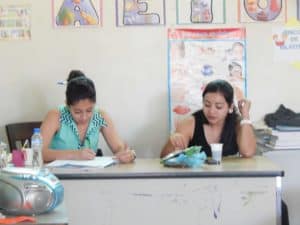
It is true enough that children are drowning. It is a faulted education system that has tossed them into the river. How many scholars, civil engineers, doctors, physicists, lawyers, artists, musicians, leaders, and visionaries are unknown to Honduras because learning was unavailable to them? It is a sobering thought.
Shoulder to Shoulder is moving upriver. Since its inception, Shoulder to Shoulder has invested in quality education for young people. Our scholarship program enables over one-hundred young people to continue their education beyond the sixth grade, even unto college. The generosity of donors is matched to young people according to merit and need. This is making a substantial difference in their lives individually as well as within the communities they come from and will go to as professionals. In 2012, Shoulder to Shoulder partnered with the Good Shepherd Community of Cincinnati and founded Good Shepherd Bilingual School in Camasca, Intibucá. The building has been erected and three grades (kindergarten, first, and second) are presently enrolled.
The school is public, accessible to everyone, and offers a quality, bilingual education. It is the only one of its kind in all of Honduras. It exists as a collaborative effort among the Honduran Government, the Municipalities of the frontier region of Intibucá, Shoulder to Shoulder, and the students’ parents. Honduras considers it a model for public education. It offers unimagined opportunities for its alumni as well as substantive change for Honduras.
Shoulder to Shoulder believes that you, our donors and benefactors, would like to be part of this historic undertaking. We humbly invite you to seriously consider sponsoring one of the Good Shepherd Bilingual School children. We are certain that this synergetic relationship of generosity and gratitude will be transformative for both you and your sponsored child. Your commitment today will illuminate the path from poverty to progress.
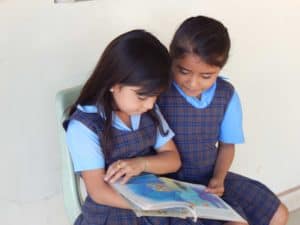
Help us to move up river! www.shouldertoshoulder.org/sponsorshipprogram
Yo Puedo Retreat 2014
November 19, 2014
This past weekend, a phenomenal event occurred for the Yo Puedo (I Am Able) girls. Yo Puedo is a peer empowerment program for girls in the fifth and sixth grade. In peer reinforced education, they are empowered to learn skills, become responsible, grow in self esteem, and start small businesses that they themselves manage and operate.
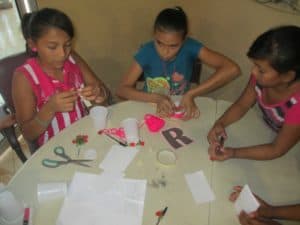
On Saturday, November 15 through Sunday, November 16, eleven girls, representatives from the twelve Yo Puedo sites from the many towns and villages of the Intibucá frontier region, came together for their second annual retreat at the Santa Lucia Clinic. Grateful for the support of teachers, parents and administrative personal from Shoulder to Shoulder, the girls celebrated successes of the past year and looked forward to new events for this coming one.
The girls received permission from their parents. A hired car drove across the frontier region, collecting girls from the various schools. They were ecstatic to see the car, confirming the reality of the retreat. Arriving in Santa Lucia Clinic around midday, the girls ran desperately to reserve their beds, covering them with personal items. A few minutes to rest, then onto lunch.
After lunch, the activities commenced. The girls introduced themselves and participated in several activities, each with its own special lesson. The “Birthday Line,” for example, had the girls line up according to their birthdays. Without using any words, this was comical, but it also demonstrated the importance of non-verbal communication and teamwork. For the activity “Treasure Bag,” two groups were given a bag including paper, crayons and markers, masking tape, scissors, with other items, and were asked to create something meaningful. They organized themselves around the project, demonstrated flourishing creativity, and recognized that each girl had a specific, critical role to play in the process.
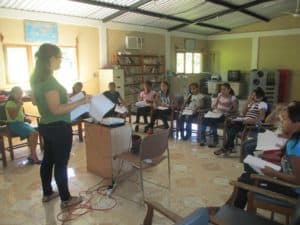
Near the end of the retreat, a few videos on self-esteem and goal setting fueled discussion about the girls’ short and long-term goals. The success of the retreat was evidenced by how well the girls came together and found their voice.
Minsis Ramos Diaz, Coordinator for Yo Puedo, is grateful to the generous hearts of sponsors. The unconditional support is truly what our young people need. The girls are taking to heart the power of the simple phrase, “I Am Able.”


